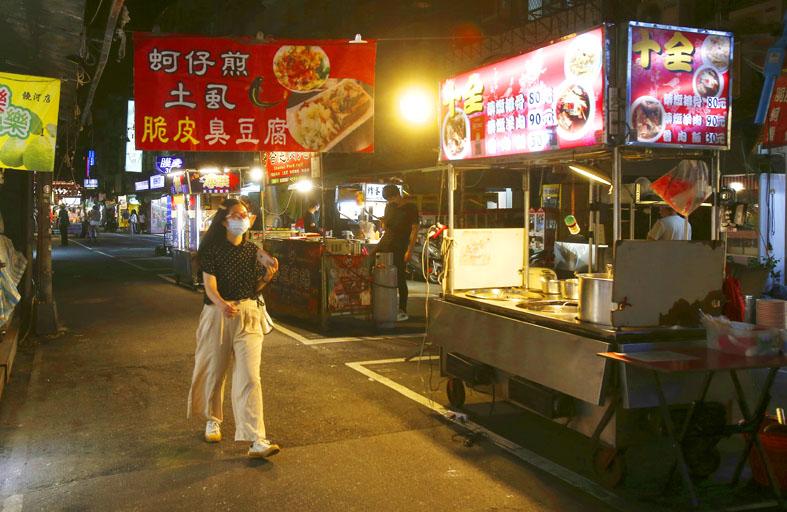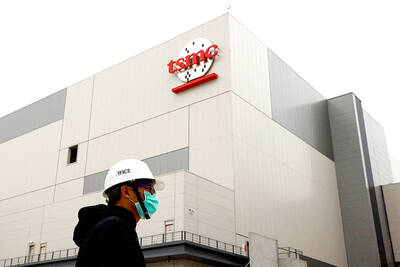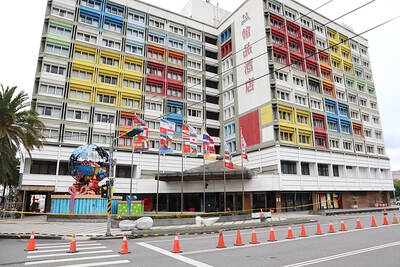The official manufacturing purchasing managers’ index (PMI) last month lost further steam, although it remained at a high level as all sectors reported business increases on the back of strong demand from abroad, the Chunghua Institution for Economic Research (CIER, 中華經濟研究院) said yesterday.
The economic bellwether shed 2 points to 64, above the booming mark of 60 for the eighth consecutive month, indicating that a COVID-19 outbreak in Taiwan had little effect on manufacturing activity, the backbone of exports.
PMI data are a gauge of the manufacturing industry, with values above 50 indicating expansion and values below the threshold suggesting contraction.

Photo: AP, Chiang Ying-ying
All subindices remained comfortably in the expansion zone, with the exception of customers’ inventory, which was 44.9, indicating that demand outstripped supply amid persistent shortages of raw materials and shipping chaos, the Taipei-based think tank said.
The pace of gains slowed for new orders, industrial production, employment, export orders, input prices, raw material prices and the six-month business outlook, CIER president Chang Chuang-chang (張傳章) told reporters.
Chang attributed the slowdown to a nationwide level 3 COVID-19 alert, which is taking a toll on consumer activity and business confidence.
The subindex on new orders softened 3 points to 64.7, with all sectors reporting a rise in business, especially suppliers of electronics and optical products, Chang said, adding that these firms are the most optimistic about business in the next six months as the high season for technology products approaches.
Taiwan is home to the world’s largest contract makers of chips, camera lenses, flat panels and other components used in smartphones, tablets, laptops and peripheral devices.
The reading on industrial output dropped 2 points to 63.8, while the gauge on export orders lowered 4.1 points to 59.7, CIER said.
The subindex on delivery times was 71.6, albeit down from a record 74.8 in April.
Container space shortages and congestion at ports remained acute due to virus restrictions in China, and rapid economic recovery in the US and Europe, Chang said.
Uncertainty over supply chains and the reliability of shipping schedules prompted firms to boost inventory, which helped keep the readings for raw material and component costs high at 84 and 61.1 respectively, down from 90.4 and 66.2 in May, CIER said.
Firms are generally positive about the six-month outlook, with that index at 64.3, down from 67, it said.
Non-manufacturing sectors bore the brunt of the virus restrictions, with the non-manufacturing purchasing managers’ index slipping 3.2 points to 46, CIER said.
The pinch is sharp for cram schools, restaurants, retailers and financial and insurance companies, it said.
However, logistics and shipping service providers, wholesale companies, and telecoms benefited from a boom in a low-contact economy, it said.

Stephen Garrett, a 27-year-old graduate student, always thought he would study in China, but first the country’s restrictive COVID-19 policies made it nearly impossible and now he has other concerns. The cost is one deterrent, but Garrett is more worried about restrictions on academic freedom and the personal risk of being stranded in China. He is not alone. Only about 700 American students are studying at Chinese universities, down from a peak of nearly 25,000 a decade ago, while there are nearly 300,000 Chinese students at US schools. Some young Americans are discouraged from investing their time in China by what they see

Taiwan Semiconductor Manufacturing Co (TSMC, 台積電), the world’s largest contract chipmaker, yesterday reported record sales for the first quarter, which analysts attributed to solid demand for emerging technologies. Consolidated revenue totaled NT$592.64 billion (US$18.51 billion) in the January-to-March period, up 16.5 percent from a year earlier, but down 5.26 percent from the previous quarter, TSMC said in a statement. The first-quarter revenue beat analysts’ average projection of NT$579.5 billion, Bloomberg News reported. That performance lends weight to expectations that the world’s most valuable chipmaker would return to solid growth this year after weathering a post-COVID-19-pandemic cratering of smartphone and computer sales. TSMC is budgeting

HUALIEN BRANCH: The company had been planning to rebuild the hotel before it was damaged in the quake and vowed to give affected employees the option to transfer The owner of Chateau de Chine Hualien (花蓮翰品酒店) is planning to lay off 86 workers after shutting down the hotel due to damage it sustained in a powerful earthquake on Wednesday last week, the Ministry of Labor said yesterday. The hotel has submitted a layoff report to the Hualien County Government and expects to let 69 workers go this month and 17 next month, the ministry said. LDC Hotels & Resorts Group (雲朗觀光集團), the owner of Chateau de Chine Hualien, confirmed the layoff plan in a statement yesterday. LDC said the hotel has been closed since Wednesday last week when the temblor occurred

US CONSCULTANT: The US Department of Commerce’s Ursula Burns is a rarely seen US government consultant to be put forward to sit on the board, nominated as an independent director Taiwan Semiconductor Manufacturing Co (TSMC, 台積電), the world’s largest contract chipmaker, yesterday nominated 10 candidates for its new board of directors, including Ursula Burns from the US Department of Commerce. It is rare that TSMC has nominated a US government consultant to sit on its board. Burns was nominated as one of seven independent directors. She is vice chair of the department’s Advisory Council on Supply Chain Competitiveness. Burns is to stand for election at TSMC’s annual shareholders’ meeting on June 4 along with the rest of the candidates. TSMC chairman Mark Liu (劉德音) was not on the list after in December last